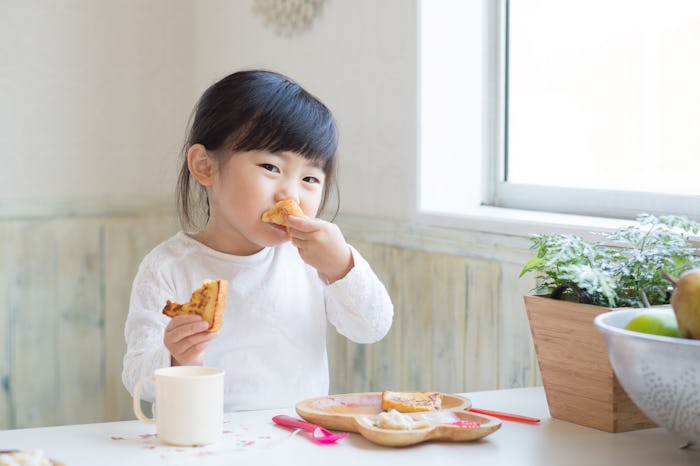Life

Here's How To Tell If Your Kid's Eating Habits Are Related To Their Stress & Anxiety
Your family's going through a stressful time — a divorce, a move — and you notice something different about your child. They're gaining weight, or their weight is fluctuating, and worse, they're acting anxious and unwell. Then you catch your child hiding snacks in their room, and isolating themselves when they used to go out with friends. Is your child an emotional eater? According to Healthy Children, parents shouldn't be surprised that children take solace in food. From birthdays to holidays, "comfort" is often associated with eating. Unfortunately, frequent emotional eating leads to health problems, and perhaps most importantly, disordered eating behaviors are also a sign of distress.
Weight changes accompanied by anxiety, sadness, and social withdrawal are all potential signs that a child is eating emotionally, but such behavior doesn't mean your child lacks willpower — only that they're struggling to handle overwhelming feelings. "Rather than dealing directly with the excruciating discomfort, the person temporarily soothes the pain with a distracting and calming behavior such as eating ice cream or pudding," observes Dr. Fran Walfish, Beverly Hills family and relationship psychotherapist and author of The Self-Aware Parent, in an interview with Romper.
Parents who suspect their child is overeating should first "take a hard honest look at the stress level within the family and in the marital relationship," advises Walfish, because children often overeat in response to fear or worry. And while you may notice upsetting behavioral changes — your child hiding or sneaking food, for instance — it's important not to get into a power struggle over snacks.
"Never attempt to control your child’s eating," advises Walfish, because a struggle only adds fuel to the fire, and could result in a full-blown eating disorder. Instead, parents should respond by modeling good eating behaviors themselves. In addition, parents should stock up on healthy foods, so their child has plenty of options. Further, share meals with your children whenever possible, and encourage them to manage their anxiety in healthy ways. At the root of this problem is always anxiety, and not food.
In an interview with Romper, Anita Mirchandani, Resident Dietician at Yummy Spoonfuls, recommends planning meals together as a family, and prompting your child to take a walk, garden, or go for a bike ride when they feel sad.
Interestingly, emotional eating is a learned behavior, according to a study in The American Journal of Clinical Nutrition, so there are things parents can do to prevent emotional eating from taking hold. As Time reported, children whose parents used food as a reward in the past, or restricted food for health reasons, were more likely to reach for food when stressed.
Even well meaning pressures at mealtime (for example, finish your broccoli) predicted more emotional eating in the study. For parents, the lesson is this: food talk is loaded. Don't scold your child or try to control their eating. Instead, offer healthy choices. By taking the pressure off mealtimes, you give children the opportunity to explore their own feelings of hunger and satiety.
Even for dieticians, helping a child develop a positive relationship with food isn't easy. On The Feed Blog, Justine Roth discusses her own challenges in talking about food with her toddler. Among other tips, she suggested neutralizing food. "Spinach is just spinach, cookies are just cookies — and food is just food," she wrote. In other words, dessert shouldn't be a reward for cleaning your plate, and vegetables shouldn't become symbols of virtue.
If your child is eating emotionally, try not to get swept up in your own feelings about food, weight, and appearances. Instead, read it like writing on a wall: your child isn't coping well, and they need your guidance, love, and non-judgmental attention now more than ever. When in doubt, talk to your pediatrician about what steps to take next.